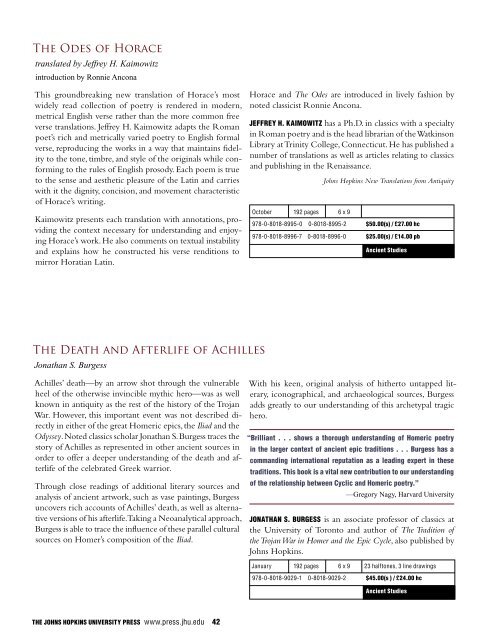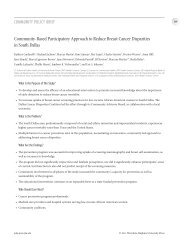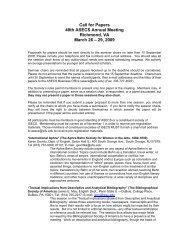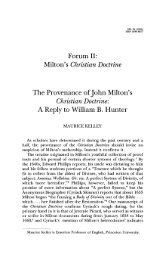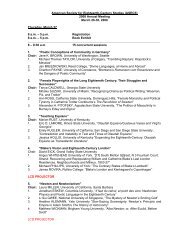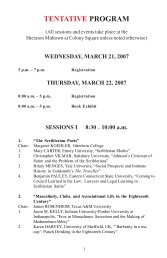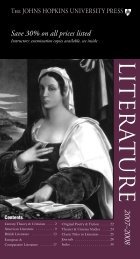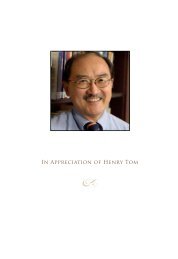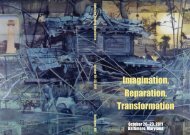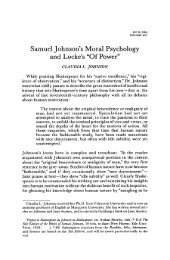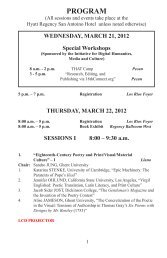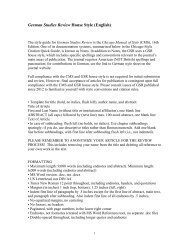<strong>The</strong> Odes of Horacetranslated by Jeffrey H. Kaimowitzintroduction by Ronnie AnconaThis groundbreaking new translation of Horace’s mostwidely read collection of poetry is rendered in modern,metrical English verse rather than the more common freeverse translations. Jeffrey H. Kaimowitz adapts the Romanpoet’s rich and metrically varied poetry to English formalverse, reproducing the works in a way that maintains fidelityto the tone, timbre, and style of the originals while conformingto the rules of English prosody. Each poem is trueto the sense and aesthetic pleasure of the Latin and carrieswith it the dignity, concision, and movement characteristicof Horace’s writing.Kaimowitz presents each translation with annotations, providingthe context necessary for understanding and enjoyingHorace’s work. He also comments on textual instabilityand explains how he constructed his verse renditions tomirror Horatian Latin.Horace and <strong>The</strong> Odes are introduced in lively fashion bynoted classicist Ronnie Ancona.Jeffrey H. KaimOWITz has a Ph.D. in classics with a specialtyin Roman poetry and is the head librarian of the WatkinsonLibrary at Trinity College, Connecticut. He has published anumber of translations as well as articles relating to classicsand publishing in the Renaissance.October 192 pages 6 x 9<strong>Johns</strong> <strong>Hopkins</strong> New Translations from Antiquity978-0-8018-8995-0 0-8018-8995-2 $50.00(s) / £27.00 hc978-0-8018-8996-7 0-8018-8996-0 $25.00(s) / £14.00 pbAncient Studies<strong>The</strong> Death and Afterlife of AchillesJonathan S. BurgessAchilles’ death—by an arrow shot through the vulnerableheel of the otherwise invincible mythic hero—was as wellknown in antiquity as the rest of the history of the TrojanWar. However, this important event was not described directlyin either of the great Homeric epics, the Iliad and theOdyssey. Noted classics scholar Jonathan S. Burgess traces thestory of Achilles as represented in other ancient sources inorder to offer a deeper understanding of the death and afterlifeof the celebrated Greek warrior.Through close readings of additional literary sources andanalysis of ancient artwork, such as vase paintings, Burgessuncovers rich accounts of Achilles’ death, as well as alternativeversions of his afterlife. Taking a Neoanalytical approach,Burgess is able to trace the influence of these parallel culturalsources on Homer’s composition of the Iliad.With his keen, original analysis of hitherto untapped literary,iconographical, and archaeological sources, Burgessadds greatly to our understanding of this archetypal tragichero.“Brilliant . . . shows a thorough understanding of Homeric poetryin the larger context of ancient epic traditions . . . Burgess has acommanding international reputation as a leading expert in thesetraditions. This book is a vital new contribution to our understandingof the relationship between Cyclic and Homeric poetry.”—Gregory Nagy, Harvard <strong>University</strong>Jonathan S. BurgESS is an associate professor of classics atthe <strong>University</strong> of Toronto and author of <strong>The</strong> Tradition ofthe Trojan War in Homer and the Epic Cycle, also published by<strong>Johns</strong> <strong>Hopkins</strong>.January 192 pages 6 x 9 23 halftones, 3 line drawings978-0-8018-9029-1 0-8018-9029-2 $45.00(s ) / £24.00 hcAncient StudiesTHE JOHNS HOPKINS UNIVERSITY PRESS www.press.jhu.edu 42
Asklepios, Medicine,and the Politics of Healingin Fifth-Century GreeceBetween Craft and CultBronwen L. WickkiserDelving deeply into ancient medical history, Bronwen L.Wickkiser explores the early development and later spreadof the cult of Asklepios, one of the most popular healinggods in the ancient Mediterranean. Though Asklepios hasbeen known as a healer since the time of Homer, evidencesuggests that large numbers of people began to flock to thecult during the fifth century BCE, just as practitioners ofHippocratic medicine were gaining dominance.Drawing on close readings of period medical texts, literarysources, archaeological evidence, and earlier studies, Wickkiserfinds two primary causes for the cult’s ascendance: it filleda gap in the market created by the refusal of Hippocraticphysicians to treat fatal and difficult chronic ailments and itabetted Athenian political needs. Wickkiser supports thesechallenging theories with side-by-side examinations of themedical practices at Asklepios’ sanctuaries and those espousedin Hippocratic medical treatises. She also exploreshow Athens’ aspirations of empire influenced its decisionto open the city to the healer-god’s cult.In focusing on the fifth century and by considering themedical, political, and religious dimensions of the cultof Asklepios, Wickkiser presents a complex, nuanced pictureof Asklepios’ rise in popularity, Athenian society, andancient Mediterranean culture. <strong>The</strong> intriguing and sometimessurprising information she presents will be valued byhistorians and classicists alike.“Wickkiser covers a huge amount of ground and provides the bestsynthesis of the current literature on the cult of Asklepios that hasbeen produced.”—Helen King, <strong>University</strong> of ReadingBronwen L. WicKKISER is an assistant professor of classics atVanderbilt <strong>University</strong>.Mathematical Works Printedin the Americas, 1554–1700Bruce Stanley BurdickThis annotated bibliography of the earliest mathematicalworks to be printed in the New World brings to light a recentlyrediscovered work from 1697 and challenges longheldassumptions about the earliest examples of Americanmathematical endeavor. Bruce Stanley Burdick brings togetherthe mathematical writings from three centers of activity:Mexico, Lima, and the English colonies of Massachusetts,Pennsylvania, and New York. Arranged chronologically, theentries include author, printer, place of publication, transcriptionof the title page, and location of original copies.Languages used in the books range from English, Spanish,and Latin to one example of an indigenous tongue.Burdick’s exhaustive research has unearthed numerous examplesof books not previously cataloged as mathematical.While it was thought that no mathematical writings inEnglish were printed in the Americas before 1703, Burdickgives scholars one of their first chances to discover JacobTaylor’s 1697 Tenebrae, a treatise on solving triangles andother figures using basic trigonometry. He also discussesAlonso de la Vera Cruz’s 1554 logic text, the RecognitioSummularum; a book on astrology by Enrico Martínez;books on the nature of comets by Carlos De Sigüenza yGóngora and Eusebio Francisco Kino; and a 1676 almanacby Feliciana Ruiz, the first woman to produce a mathematicalwork in the Americas.American readers of all nations and origins will note withinterest that many of these works, including all of the earliestones, are from Mexico, not from what is now the UnitedStates. But what their diverse authors had in common wasthat they were clever and well-trained colonial people whoused European mathematics to solve American problems.Bruce Stanley BurdicK is a professor of mathematics at RogerWilliams <strong>University</strong>.<strong>Johns</strong> <strong>Hopkins</strong> Studies in the History of MathematicsRonald Calinger, Series EditorOctober 160 pages 6 x 9 7 halftones, 3 line drawings978-0-8018-8978-3 0-8018-8978-2 $55.00(s) / £29.00 hcAncient Studies / History of MedicineJanuary 264 pages 6 x 9 29 halftones, 2 line drawings978-0-8018-8823-6 0-8018-8823-9 $55.00(s) / £29.00 hcHistory of MathematicsTHE JOHNS HOPKINS UNIVERSITY PRESS 1-800-537-5487 43


